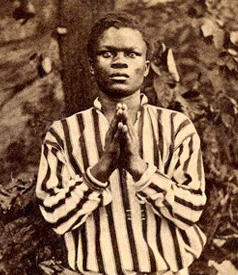Washington – It was bad enough when Virginia Gov. Bob McDonnell proclaimed “Confederate History Month” without mentioning slavery, but at least he came to his senses and apologized. Mississippi Gov. Haley Barbour’s contention that the whole controversy “doesn’t amount to diddly” is much worse.
“I don’t know what you would say about slavery,”Barbour told CNN, “but anybody that thinks that you have to explain to people that slavery is a bad thing, I think that goes without saying.”
And that’s the problem — Barbour thinks it “goes without saying.” The governor of the state whose population includes the highest percentage of African-Americans in the nation believes it is appropriate to “honor” those who fought for the Confederacy. Clearly, he has no problem with revisiting the distant past. Yet he sees no reason to mention the vile, unthinkable practices — state-sanctioned kidnapping, torture and rape — that those Confederate soldiers were fighting to protect.
It amounts to much more than “diddly” that so many Americans try hard to avoid coming to terms with the reality of slavery. It wasn’t just “a bad thing.” Littering is a bad thing. Slavery was this nation’s Original Sin, and yet many people will not look at it except through a gauze of Spanish moss.
The Atlantic slave trade was one of the last millennium’s greatest horrors. An estimated 17 million Africans, most of them teenagers, were snatched from their families, stuffed into the holds of ships and brought to the New World. As many as 7 million of them died en route, either on the high seas or at “seasoning” camps in the Caribbean where they were “broken” to the will of their masters.
If he has never done so, Barbour should hold in his hands some of the leg irons, manacles and other restraints that were used to subdue the Africans. He should visit some of the plantations where slave cabins still stand — there are plenty in his state — to get a sense of how the Africans lived. He should spend a long, hot day picking cotton. He should read the accounts of plantation life written by former slaves, and then he should explain why there is any reason to “honor” soldiers who fought to perpetuate a system that could never have functioned without constant, deliberate, unflinching cruelty.
The point, of course, is not that Haley Barbour, Bob McDonnell or any other white Southerners living today are responsible for crimes committed long before they were born. They shouldn’t have to feel guilty for things they didn’t do. But they — and the rest of us, too — should know the extent to which the history of this country was shaped by what was euphemistically called the “peculiar institution.” Americans should know, for example, that Wall Street’s rise as a financial center was largely fueled by the cotton trade, which could not have functioned without slavery — and that when the Civil War began, the mayor of New York, Fernando Wood, tried to find a way for the city to remain neutral so that it could continue its lucrative business dealings with the South.
What “doesn’t amount to diddly” is the revisionist notion — which Confederate History Month celebrations perpetuate — that the Civil War was about something other than slavery. The “lost cause” diehards insist that the treasonous rebellion was a fight over freedom or the Constitution or states’ rights. But the “right” that was being fought over was the ability to own human beings, compel their labor, buy and sell them as if they were livestock, exploit them sexually and torture or kill them if they tried to escape.
McDonnell’s apology, at least, recognized that slavery was nothing to be proud of. It should be noted, however, that Virginia’s previous two governors — both Democrats — did not feel the need to proclaim Confederate History Month. McDonnell’s original proclamation, before he amended it, seemed designed to appeal to a fringe group for whom the Civil War is still an open question.
This is a free country — for black people, too, thanks to the defeat of the Confederacy — and so if some white Southerners want to celebrate the “heritage” of slavery, they are welcome to do so. But while they’re entitled to their own set of opinions, they’re not entitled to their own set of facts. I’d say that Haley Barbour’s studied ignorance was “a bad thing,” but that would be a gross understatement.
Eugene Robinson’s e-mail address is [email protected].
(c) 2010, Washington Post Writers Group
3 Days Left: All gifts to Truthout now matched!
From now until the end of the year, all donations to Truthout will be matched dollar for dollar up to $38,000! Thanks to a generous supporter, your one-time gift today will be matched immediately. As well, your monthly donation will be matched for the whole first year, doubling your impact.
We have just 3 days left to raise $38,000 and receive the full match.
This matching gift comes at a critical time. As Trump attempts to silence dissenting voices and oppositional nonprofits, reader support is our best defense against the right-wing agenda.
Help Truthout confront Trump’s fascism in 2026, and have your donation matched now!
